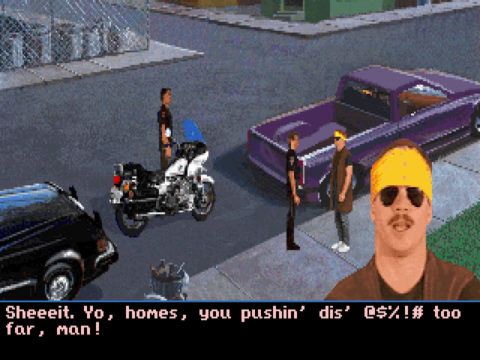
Blue Force
Written by: Rik
Date posted: March 29, 2009
- Genre: Adventure
- Developed by: Tsunami Media
- Published by: Tsunami Media
- Year released: 1993
- Our score: 3
In case it isn’t obvious from the name – and it isn’t, because Blue Force is a terrible name for a game (although it is quite a good one for urinal cakes) – this is yet another semi-serious police-based romp, the type of thing for which we seem to have developed an affinity in recent months. The main noteworthy feature of this one is that it was written by Jim Walls, the ex-cop who was behind Sierra’s Police Quest games until part three, The Kindred, after which he and the company went their separate ways. While the PQ name lived on for a little while under the eye of ex-LAPD chief Daryl F. Gates, taking the series into slightly grittier territory, Walls teamed up with Tsunami Media to bring us yet another tale of small-town police work.
Although information on the game out there in internet-land seemed relatively sparse for a title with a reasonably big name (by 1990s video game standards, at least) attached to it, I approached this one with a certain amount of optimism – after all, Police Quest 3 was actually quite good, and I reasoned (logically enough, I thought) that this one might be as good or even better. Sadly, having played the game, such a positive outlook can now best be described as naive, as unfortunately Blue Force is a disappointing, amateurish effort that represents a poor cover version of a Police Quest game, albeit one featuring the original, er, singer. It’s a game you’ve played before, but better, which calls into question the point of the whole enterprise in the first place.
The setup will be extremely familiar to anyone who’s played any of Walls’ games before, and again you take the part of a rookie cop in a small town. Our protagonist this time around is called Jake Ryan, a macho Hollywood-movie name if there ever was one, and hopes that you might be playing a slightly more maverick character than clean-cut Sonny Bonds are raised further when you observe him arriving at work on a motorbike during the opening scenes. Sadly, the opposite is true, with the close-up representation of Jake seemingly provided by an ageing chap from Tsunami’s marketing department who definitely looks more of a Jeff to me. While Jake/Jeff is supposed to be in his twenties, this chap is receding, portly and not a day under 35. Oh, and he lives with his Grandma too, dutifully parking his bike in her garage at the end of each day before helping out with dinner. At least Bonds had his own place.
In fairness, though, Jake’s had a tough time of things since both of his parents were brutally murdered in the family home when he was just a child, leaving Granny to bring him up. Daddy Ryan was a cop, too, and it seems that just before he died he was working on something that might provoke a shady criminal type to break into his house and put a couple of bullets in his head. The killer was never found or brought to justice, however, and when Jake follows in his father’s footsteps by joining the local force himself, he starts to uncover evidence related to his parents’ death.
Ooh, intriguing. How will the story end? Don’t worry, I won’t tell you (although if you want one or two spoilers, see Hide in the Closet, Jake!, for more). However, before you get to jump onboard this rip-roaring rollercoaster plot ride, there are more mundane matters of routine police work to attend to. So the first half of the game sees you go about your daily duties, placing an emphasis on doing things in a vaguely correct manner.
In general this means responding to calls, keeping in touch with dispatch via your radio, calling for backup when required and choosing the least gung-ho options when presented with danger. Just like in Police Quest, you get points for doing things right, as well as the occasional ‘game over’ if you make a mistake or try and do something really stupid such as, oh, I don’t know, attempting to clean your gun while it’s loaded. As with Police Quest 3, there’s then a ‘dramatic incident’ roughly halfway through the game which heralds the start of your investigation proper.
All of which is fair enough, if not terribly original. Unfortunately, though, the implementation is pretty sloppy. Production values are poor by the standard of the day, with the grainy graphics arguably representing a step backwards from earlier PQ efforts. The animation of the characters is simply terrible, and they lurch erratically across the screen at an embarrassingly slow speed. Sound, meanwhile, is virtually non-existent, with some genuinely awful music only occasionally punctuated by digitised effects.
The interface is also fairly cruddy, and in a game with fairly limited options in terms of interactivity, it really shouldn’t be too hard to come up with something that works. Here, though we have a system where you use one icon to look at things in the game world, but another icon to look at something that’s residing in your inventory. Most annoyingly, examining something before you pick it up will often bring you points if you find anything interesting, but if you make the mistake of picking the item up first, that information is deemed to be lost forever. You’ll still have the item, and the game will tell you what it is, but you can’t examine it and look for any related clues once it’s in your inventory. Which is, of course, ridiculous.
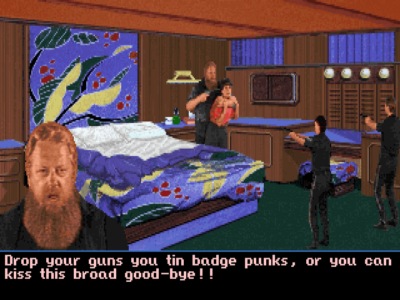
What’s more alarming – the beard, or the dialogue? Why not write in and let us know. If you’re right, you could win a prize.
The game itself seems quite light on content, and it shouldn’t take the average player more than a few hours to get to the end. While your character is supposed to be a beat cop, there’s very little chance to actually explore the game world, and although there are a whole host of locations that appear on your map from the very start, most of them seem to have a single, functional purpose in the story. There a definite sense of Blue Force being a set series of events to which you’re forced to respond rather than a more traditional adventure game.
One the plus side, some of those events are reasonably exciting, and an early hostage situation places your decision making in the heat of the moment under quite close scrutiny. It’s very easy to panic and do the wrong thing, and the relief is palpable once it’s all over. It’s actually a cut above similar ‘danger’ situations in PQ games and it’s one of the few things Blue Force does well. You have to make the right choice at the right time, a bit like some of those video-heavy adventures from the mid-90s – the one difference being of course that Blue Force doesn’t have the video clips, or even any speech. Apparently it was released on CD, but it was identical to the floppy version. I mean, these bits are still quite good, but without calling for the return of video clips or the dreaded ‘interactive movie’, it’s worth pointing out that if you don’t have the technological justification for scenes of limited length and interaction, all you’re left with is, er, scenes of limited length and interaction, but, like I said, without any speech or video (I think we’ve laboured this point long enough, thanks – FFG reader). They’re still good though (CUT! – FFG editoral board).
So, technically Blue Force isn’t great, and the story does little to redeem the situation. Jim Walls’ writing always was a little one-dimensional and clunky, but again this game seems to represent a retrograde step from the likes of Police Quest 3. The plot is dull, the characters have nothing to say for themselves, and the whole thing limps to a fairly inevitable conclusion. There are no twists, no double-crosses, nothing remotely surprising happens at any stage – you just have to catch the bad man who did the bad thing.
Ultimately, there are very few reasons to play Blue Force at all. At best, it represents mild novelty interest for those who want to see what the creator of Police Quest did after he left Sierra. While the answer is unfortunately, “he went and made quite a bad game called Blue Force”, if you really got a kick out of the earlier Police Quests, there’s probably enough here to keep you interested for a few hours. For everyone else, well, if you don’t trust my judgement, you might want to take note of the following one-line summary of the game, delivered by a professional games reviewer at the time:
“Tiresome controls and sloppy design mar what could have been a decidedly average adventure.” – PC Zone UK, September 1993
He’s right, you know. We both played the game so you don’t have to. Now go and do something more meaningful with your spare time.

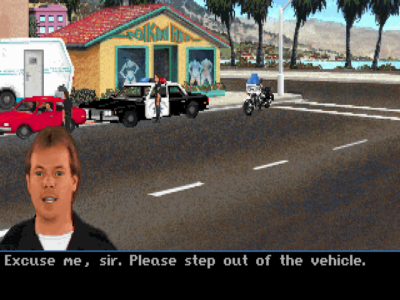
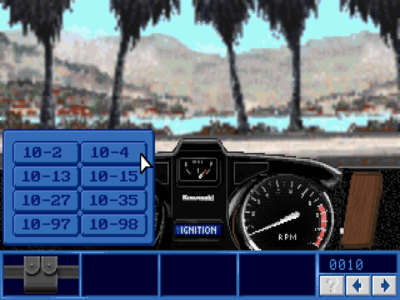
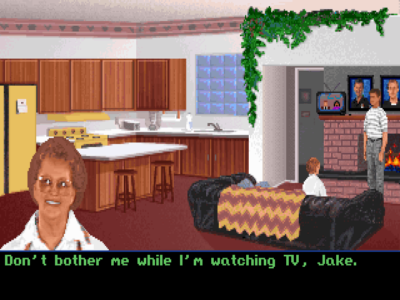

 Posts
Posts